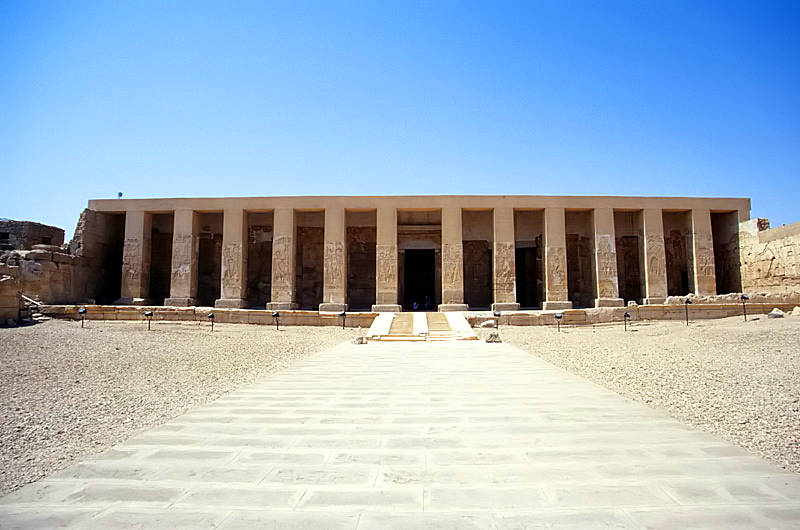There’s a lingering memory, an experience, that stays with me from my childhood. I’m not sure exactly how old I was at the time, maybe seven or eight—not long after my family moved from Manhattan to Queens in NYC. I remember that I had recently made my first communion at the local Catholic church when I began to feel frightened by the idea of death. Most nights left me tossing and turning, afraid that if I fell asleep, I would somehow disappear. One night, however, as I gazed out the bedroom an image appeared—not so much an image, but a solid person waving and smiling as if to say, no worries, I’m here.
Through the years, I’ve thought about the encounter, remembering the calm that pervaded the room as the bald, round-faced man gazed at me with gentle kindness. Recently, and what brings me to write this, is an episode on the History Channel about a woman, Omm Sety (Dorothy Eady 1904 -1981), who dedicated her life to Egyptology, specifically the study of the Temple of Seti at Abydos, where she said she once lived. There is much written about Omm Sety and I recommend a book by Jonathan Cott, “The Search For Omm Sety”, which is a fascinating account of her life and her encounters with King Seti I, supposedly in person, in the flesh, romantically through astral travel. Normally, I would file this as simply interesting, but what grabbed me, was that the image shown of King Seti’s mummy closely resembled the man I saw as a child in my window.
The Edgar Cayce readings (available from the Association for Research and Enlightenment, A.R.E) say that ancient Egypt was a colony of Atlantis before its cataclysmic demise and remained a powerful world influencer throughout its history. While fascinated with Egyptian history, I don’t feel that I lived at that time, which makes my childhood vision confusing. Instead, I feel more connected to Lemurian influences and the pre-history conflicts with Atlantis which caused planetary chaos.
A belief in reincarnation fuels my interests and studies, however, you need not believe in it to consider how our actions affect the planet’s future and spiritual advancement. History repeats itself to allow our souls to progress through the Yugas—A Hindu term that defines the four steps in mankind’s development. In our current position in Kali Yuga, living is hard, but the lessons and rewards are great. Some similarities between the pre-destruction time of Atlantis and Lemuria:
- High technology and science are predominant.
- Religious thought struggles and is often falsified then used to control the weak-minded.
- Money and wealth are king, with little regard to Karmic (the law of cause and effect) consequences.
- Those in power lie, cheat and steal to further unholy agenda.
- Planetary abuse in the forms of waste, pollution, carbon emissions etc. create increased weather extremes, shortages, and natural disasters.
- Earth changes create famine, destruction of habitats, and a vast migration of peoples escaping unhealthy and dangerous situations.
- WAR!
However, before we get all hung up on the negative, remember that we have the free will, to do it differently. We are God’s children with a divine right to everything we need to return to higher planes and ways of thinking. We struggle with dualities: right/wrong, good/evil, rich/poor, love/hate etc. Which way will we go? I like to think that we’ll make it through, but not without tremendous effort and above all else, love.
So, what’s to be done? The signs are there, but it’s not as simple as living “Green”, although common sense dictates that we need to clean up our environmental act. But let’s look back at the commotion and chaos that destroyed civilization during the last Yuga cycle. Information from the Cayce readings, and elsewhere suggest that high technology—not evil in itself—created a scenario where humankind was capable of mass destruction, which apparently backfired way beyond what was imagined. The Hopi Elders say that someone “pushed the wrong button”. Other religious texts talk about great floods, mass migrations, and folks moving underground. (Check out the underground city of Elengubu, known today as Derinkuyu.) Many cultures speak about places of emergence whenever the coast was clear. No matter what you feel is true, there is still no denying that we are at a crossroads.
One of the goals of the “Mu the Motherland” is to help us to calm down and take a look around—setting aside our differences and focusing on our strengths. The political world is divided, more or less in half, which sets the stage for civil unrest, cultural division, religious fanaticism, and wars. We can counteract by broadening our horizons and accepting our neighbors. Which brings me to immigration. The world is still large enough to accommodate populations if we work towards common sense goals. Primal instincts set us up to fight to hold on to territories and repel invaders. However, people are on the move and letting individuals and families die at border crossings, at sea, in deserts etc. is not an option. The issues are complicated, but they can be figured out. Bottom line—violence is never a solution—love is the answer. Peace.
Image Source:
Roland Unger, CC BY-SA 3.0, via Wikimedia Commons


